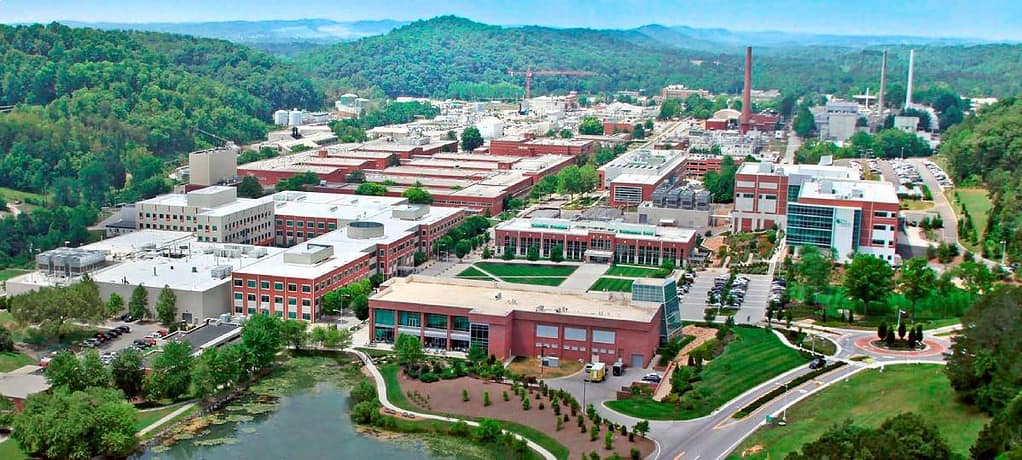Years before becoming a researcher at the Department of Energy’s Oak Ridge National Laboratory, Corey Cooke hit a discouraging setback in his pursuit of an advanced degree. A misunderstanding about his research funding led him to leave his doctoral studies after a year. He later switched colleges to resume the effort through Tennessee Technological University in Cookeville, which helped him finish while he worked full time in Washington, D.C.
Working through this challenge helped prepare Cooke for his current role helping young researchers navigate their graduate studies as he coordinates a partnership between ORNL and Tennessee Technological University’s electrical and computer engineering program.
As a joint faculty member, Cooke teaches online courses and advises students pursuing graduate degrees, which creates a pipeline bringing newly minted researchers to the lab while helping enhance the expertise of current staff. It’s one of the many ways that Cooke, who recently began leading the Radio Frequency and Intelligent Systems group in the Energy Science and Technology Directorate, promotes growth and collaboration.
The Tennessee Tech program is ideal for the lab’s non-traditional students. “ORNL researchers represent a demographic that is hard to serve in higher education while they are working,” said Cooke, whose own research encompasses wireless and radar communication systems. “We have people here already doing work above their educational level – researchers with bachelor’s degrees doing Ph.D.-level work. We want to help those people bring their credentials in line with their skills, while expanding their professional opportunities.”
Cooke steers ORNL employees through the lab’s tuition assistance process and helps them choose study topics that springboard from their lab research, as he did when pursuing his doctorate while working at the U.S. Naval Research Laboratory.
The lab as classroom
A Tennessee native, Cooke encourages top students from Tennessee Tech to explore opportunities with ONRL. One of those students, Tyler McCormick, took a class with Cooke while pursuing a master’s degree. “I would never have come to the lab if it wasn’t for him,” said McCormick, who previously thought ORNL conducted only nuclear research and only hired scientists with doctorates. After two years as a researcher in ORNL’s National Security Sciences Directorate, or NSSD, McCormick plans to continue into the Tennessee Tech doctoral program in the fall.
Cooke arrived at ORNL in a similar way, after interning at the lab under the past Tennessee Tech program liaison, former ORNL researcher Adam Anderson. After Anderson moved on and Cooke was hired as a researcher in NSSD, Cooke wanted the cohort to continue so others could receive the same benefits.
“I would never have come to ORNL if Adam hadn’t brought me here that summer, because I had no idea that ORNL did wireless research,” Cooke said. Experts at leading regional universities don’t seem to know either – a situation Cooke aims to change partly through publications by ORNL’s Tennessee Tech students.
“I can help staff carve out an unclassified aspect of their results for use toward their degree,” Cooke said. “They can try out aspirational ideas and be published, which also gives the lab visibility and attracts national security research projects so we can go deeper in that area.”
Hollis Neel, a research associate in NSSD’s Resilient Communications group, was a prime candidate for the Tennessee Tech cohort. While earning a bachelor’s degree in math and a master’s in geography, Neel helped found the Small Satellite Laboratory at the University of Georgia. After contributing technology to two satellites, Neel took an ORNL job in geospatial science. “Hollis came here with so much practical experience,” Cooke said. “How many people have put something in space?”
But to support his new role, Neel saw a need to shore up his foundational knowledge in engineering and data science. In 2021, Cooke encouraged him to pursue a doctorate with Tennessee Tech.
For Neel, having an advisor who works at ORNL makes it easier to balance work and study. “When I have a sponsor-mandated obligation that would interfere with a class or a deadline, I have the flexibility of being able to work around those job obligations,” he said.
Neel praised Cooke’s style of teaching classes including communications theory, random signals and systems, wireless communications and signal analysis. “He’s exceptionally bright yet has zero issue admitting when he doesn’t know something and will go straight to the white board and derive it,” Neel said. “That willingness to return to first principles was really fun and enticing and not something that is shared across the field.”
Neel found himself learning skills that were immediately useful at work. “Every single class, there was zero doubt as to how it was directly applicable to the communications field,” he said.
This Oak Ridge National Laboratory news article "Sending clear signals: Cooke bridges academia, industry in ORNL-Tennessee Tech collaboration" was originally found on https://www.ornl.gov/news

